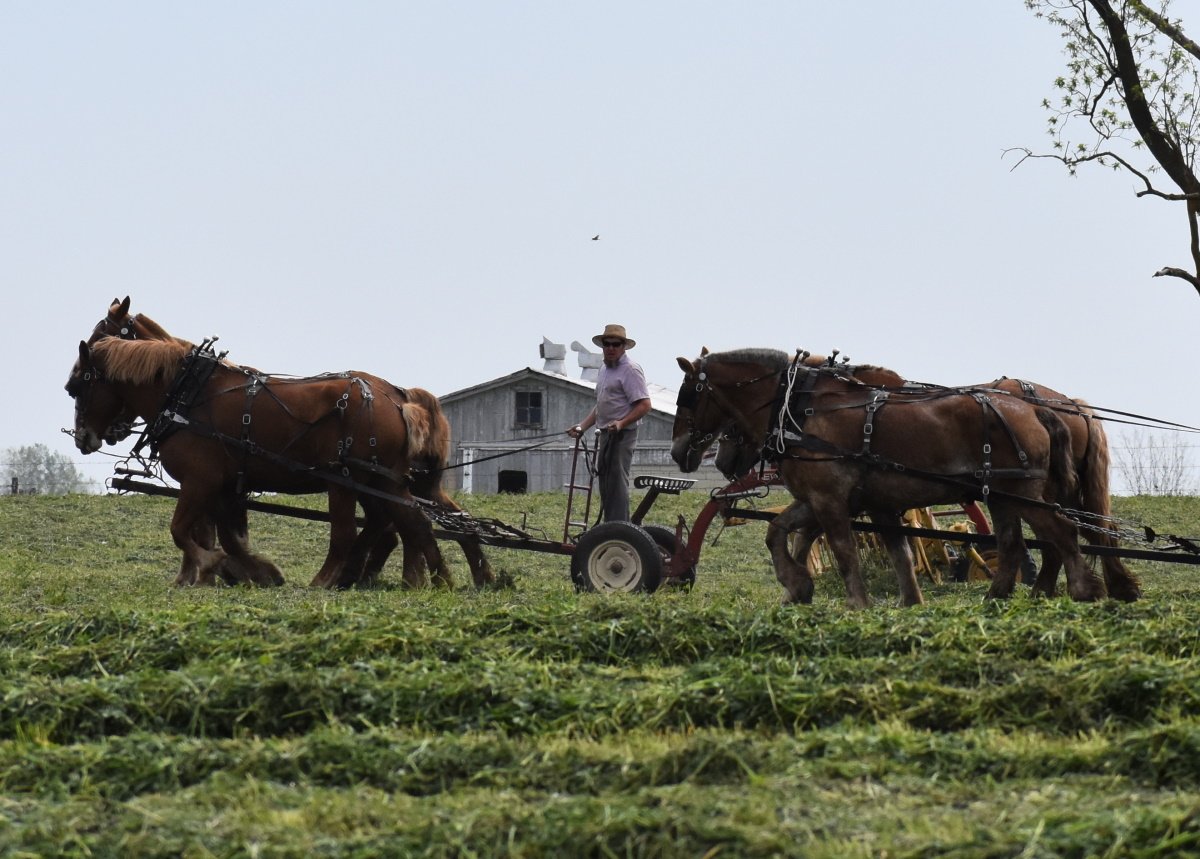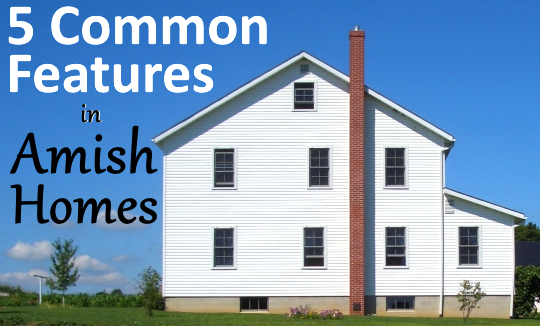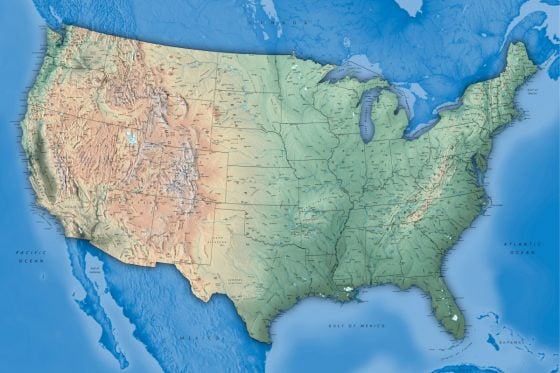Black Amish Communities: Do They Actually Exist? (Debunking Odd Claims)
The Amish, with their European roots and generally “closed” communities, are a predominantly white society. But still, you may have wondered if there are any black Amish people. And for that matter, are there any full-fledged black Amish communities?
I have to say you’ll find some odd information around these questions, depending where you look online. And the answers are not 100% straightforward. But it seems a lot of people are asking about black people in Amish society. That’s one reason I decided to write this. Allow me to explain.
Jump to:
Are There Amish Black People?
Amish Adopting Non-White Children
Black People Joining the Amish?
Black Amish Communities?
Black Mennonite People
Conclusion
Are There Black Amish People?
So the short and quick answer to this question is: yes and no.
Before you scratch your head, here’s what I mean.
The Amish originally came to North America from places like Switzerland, Germany, and France. This goes to say that they are a predominantly white, European-origin community.
But…that doesn’t mean that people of non-white background have never entered Amish society. There are tales of some Amish with possible Native American ancestry, for example. However, the nature of the Amish community as an effectively closed society means it is very difficult for “black Amish people” to become a thing (much less entire “Black Amish Communities”).

So why “yes and no”? On the one hand, black individuals have become a part of Amish society, in at least one way described below. But when it comes to joining the Amish church, that is another question entirely. Amish individuals opt to become Amish by being baptized in a choice made when they reach adulthood.
So when we talk about “Amish children” in general, we are talking about non-members of the Amish church. They attend church services and are a part of the community, but don’t take on the full status and obligations of a member until they choose baptism.
So what’s the point? Well, if you say someone is “Amish”, there are two different categories here – members and non-members. And, you do occasionally hear of adult baptized black Amish people who are currently members of an Amish church. But it’s very uncommon, for reasons explained below.
So next let’s have a look at two ways that black individuals can enter Amish society.
Amish Adopting Black Children
It is true that people of an African-American or other black background have entered Amish society. One way that you might see black Amish people is through adoption. Amish do adopt children. They value having large families. And just like with non-Amish people, sometimes Amish couples can’t have children.
In some situations Amish adopt Amish children. This usually happens in the case of tragedy, as when in 2011 in New York state, Amish parents of twelve were killed in a road accident. The orphaned children were later adopted by an aunt and uncle.
Amish also adopt non-Amish children. These may be children from the United States. They also may be from other countries, such as countries in Latin America or Europe. And in some cases these children are not of a white ethnic background. They may be black or Latino, for example.
This is not common, but it does happen. And it is one way in which black individuals become a part of Amish society. One well-known (possible) example of this would be Alan Beiler, from the program Amish Mafia. I’ll explain why I say “possible”.

Beiler was allegedly adopted as a boy by an Amish family in Lancaster County, Pennsylvania (it has also been reported in places to be an Amish-Mennonite family). He says he was “raised Amish” and speaks Pennsylvania Dutch, but apparently did not become a member of the church. Going by the photo below, he appears to be wearing traditional Amish clothing as a child, though the woman he is with (his adoptive mother – or other relative?) has an appearance that is Plain, but not exactly Lancaster Old Order Amish.
In any case, other examples of Amish adopting non-white children can be found. In the book An Amish Paradox, about the large Holmes County, Ohio Amish community. In it, the authors note the case of an unmarried woman who adopted an African American child (p. 268). In another example, an Amish bishop describes how his sister and her husband “adopted four biracial children”, explaining that “they just wanted children to lavish love on” (p. 101). Though it might not be common, some Amish families are open to the idea of adopting non-white children,
So there are occasions where Amish adopt children of other races and ethnicities. This is rare, however. And there’s one further issue there. Just because someone is adopted into the Amish, that doesn’t mean they’ll necessarily remain Amish as an adult. More on that below.
Do Black People Join the Amish?
But first, you may be wondering, what about black people becoming Amish as converts? Could black individuals join the Amish church?
In theory, yes. Black people could join the Amish. However, the Amish are unlike many other Christian denominations in one important way.
Amish, as a rule, do not try to attract converts. They don’t evangelize and try to proselytize others to join their churches. They don’t send missionaries overseas to try to get people to become Amish. They are very unlike evangelical Christian churches in this sense. There are various reasons for this.
Essentially, Amish don’t seek people of any color to join their churches. Now, they won’t outright reject a true-hearted seeker. But most Amish don’t encourage it.
This is for a few reasons. One reason is practicality. It’s unlikely that most people would be able to adopt and dedicate themselves to an Amish lifestyle, in order to be a full-fledged member of the church.
This would mean not only adopting the plain dress and appearance, turning in the car keys and unplugging the internet, learning to handle and drive a horse-drawn buggy. There is more to the Amish way of life than just that.

It would also mean learning and entirely different way of speaking – the “Amish language” (Pennsylvania Dutch) – accepting Amish Christian theology, as well as adopting a different way of thinking to what is typical in America today (valuing the community over individualism, for a start). That last part is harder than it might seem.
All these are obstacles which make it unlikely and impractical for an outsider to join, no matter the person’s skin color. Additionally, the Amish don’t really have a need for converts. They have large families and most of their children join the church. They are already growing at an incredible rate, with their population doubling every twenty-odd years.
So Amish tend to focus their energies on their already-large families and in modeling Amish Christian ways in the hopes that their children will decide to join the Amish church when they’re of age. Thus, Amish don’t look to increase the numbers of black Amish people” or any-other-ethnicity-Amish-people for that matter, in their ranks.
There’s an additional issue for a black Amish person that needs to be mentioned as well: acceptance into the community. For a black Amish individual in Amish society, this could be a challenge. While such a person would be accepted in some Amish churches, in others it may be more difficult.
Finding a life partner (husband or wife) as a black Amish person might also be a challenge. That’s not to say that this necessarily reflects racism. It’s to say that an interracial Amish marriage would be unconventional in a society which on some levels values conformity (see An Amish Paradox chapter 8 for more on this aspect).
“Black Amish Communities”
So what about “black Amish communities”? One source I recently came across makes some interesting claims, such as that “One of the most striking aspects of black Amish culture is the blending of African-American traditions with Amish customs.” Furthermore, “This mix of cultures not only makes the black Amish society stronger, but it also shows how different Amish culture is in a new way.”
Another source claims further eye-catching facts, such as that “Black Amish communities also have their own style of gospel music, which combines elements of both Amish and African American cultural traditions.” We also learn that “While the Amish generally do not pursue higher education, the Black Amish have embraced the importance of education and have made it a priority.” There is more where that came from.
So just where are all these Black Amish communities to be found? The first source goes on to claim that “there are Black Amish villages all over the U.S.” The other also claims that they can be found in states like Indiana and Pennsylvania. However, no precise location where these “black Amish communities” might be is ever given.
And that is because there is no such thing as a “black Amish community”, or “black Amish village”, (and so on), for reasons given above. So why do some sites, like the one in this screenshot below, feature long articles claiming this to be the case?

There may be a couple things going on here to explain this.
Black Mennonite People
One explanation: It happens fairly often that people confuse non-Amish communities with Amish ones. Particularly with related religious groups, like Mennonites or Beachy Amish, a group that resembles the Amish in some ways, but permits cars and other higher technology. Perhaps this and other sources are making this mistake.
There are, in fact, black Mennonite communities. Black Mennonites live in the US, Canada, Africa, and other places. Unlike the Amish, some Mennonite groups do engage in evangelical mission outreach. There are also organizations such as the African American Mennonite Association.
But “Mennonite” does not equal “Amish”. They are related (in some cases, more distantly than in others), but two different things. Mennonites generally are more modern than Amish, though there are some very plain Mennonite churches as well (though that’s a whole different subject).
Another explanation…
Another explanation? Terms like “black Amish people” are also fairly heavily-searched online. So there is always that simple motivation to create content around the idea of fictional “black Amish communities”. But writing about black Amish people or black Amish culture does not conjure black Amish communities into existence.
Black Amish People: Rare At Best
It’s understandable that there are no black Amish communities, and that black individuals in Amish society are rare at best. The Amish as a whole are of a white European background. Unlike many American Christian denominations, they do not seek converts and do not send missionaries to grow their ranks. And one reason is that there is no need for it.
Rather, their growth is natural. Amish have huge families by most modern standards. The actual size varies by the community, but an average of six to eight children is typical. And most of those Amish youth choose to be baptized into the Amish church when reaching adulthood. It’s one reason that the Amish population is over 370,000 today, and growing rapidly.
So conversion to the Amish church is not a realistic pathway by which a community of black Amish people could exist. Now, self-motivated people can seek to join the Amish. This happens on occasion (but just as often, or even more often, they fail to remain in an Amish church).
A black person could join the Amish in this way. However the numbers of joiners are very low to begin with. I have never met or even heard of a black Amish “seeker” or convert (that’s not to say they’ve never existed, just that it would be very rare if so).
So essentially the main way that black people might enter Amish society is really through adoption. And again, there’s no guarantee these individuals will choose to remain in the Amish church (that is, choose to become a member by being baptized, usually at the age of 18 to 22).
So despite what you might read or hear, black Amish church members are very uncommon, and there are no black Amish communities, villages, towns, colonies, clubs, groups…or anything of that sort. All that noted, I look forward to hearing of any examples or “exceptions that prove the rule” that you might be aware of.






Great Research with Explanations
Erik,
I really admire the way you take a controversial subject (or rumor) and explain it in such detail. Thank you, Jim
Thank you Jim, happy if it was useful. Have been seeing more out-there claims like these get prominence online. Lately there’s another one about Amish children’s (supposed) immunity from major diseases.
Black Amish
I’ve seen one black Amish in York county PA(next to Lancaster). I was told by an Amish friend…he was sent to York because he “just wanted an Amish girl to marry” The Lancaster Amish didn’t accept his bid for membership.
Interesting, so was this fellow dressing/living as Amish but just hadn’t been baptized? Any idea why he was sent to York County? (I assume that means encouraged to go there) Relatively few Amish there, though I know one of them and will ask him next chance I get.
Black Amish
There are several Amish farms in southern York county. As I mentioned above, it was told to me by an Amish friend, he was ‘sent’ away from Lancaster Co. as they would NOT accept him into their church/baptism (for several reasons). I feel badly for him if his heart is ‘pure.’ Really non of my business but I’ll admit I was curious. You may get more information at an “Amish” store called “The Brown Cow” on Delta Rd. I saw him in there talking to the owner.
Excellent Post
Those excerpts about “black Amish communities” sound like they were written by a bot.
They do sound that way.
Not a bot
It’s concerning that some may not accept truth amongst those of us who serve the Amish community (& have made friends with them )on a daily basis…not sure how a “bot” or even why……I can assure you I am real …lol
Amish
I’ve personally seen a black child with an Amish family in Lancaster but a whole community is just fiction.
Enjoy them in action: Gotthard Base Tunnel opening ceremony
John Doe
You Qanoners are everywhere! Good grief!
Thank you!
Thank you! In my work as a tour guide in the Shipshewana, IN area, I get asked this question on a regular basis. This is great information which I will share on my Amish Indiana Facebook page.
Doesn’t the bogus “information” out there drive you crazy? The oddball and unfair-Amish-stereotype things I have had to help some of my tour clients unlearn is just ridiculous!
Amish
I have only seen a few Mennonite Black Amish folks. They were at an Auction and I found it odd because in our small community of Old Order Amish in Glen NY we have none. I was at the auction in Romulus NY when I first seen some. It does make you think abit. The Amish in my community are wonderful people if I had of been young when I found these folks I would have joined them. I help them and they help me it’s wonderful.
Sad to say....
I don’t know of any, and I don’t believe there are any, black or biracial members of the two Amish communities with whom I am familiar. The New Order community 25 miles north of me contains none…but, I did hear a father and 19-year-old son discuss it: the son was advocating that it would be OK, with marriage OK, while the father was trying hard to say that it would be OK for there to be black people in the Amish church, but couldn’t bring himself to say that he could accept marriage. In the Troyer Amish community in which I have several dear friends, they are very prejudiced against black/biracial people and would not accept such into their family, church or community. I do not like this at all, and have asked them not to make derogatory comments in my presence since I am not predudiced against any “race,” and, also, I have many black and biracial family members. This Troyer Amish community is very conservative in its values, and very isolated, even from other Amish…I think they hire drivers who are from “redneck” cultures and who dispense racially derogatory comments when they drive the Amish. I, too, am from a redneck culture, but my faith in God and my experience do not allow or condone racial prejudice (“For all have sinned and fall short of the glory of God….” Romans 3:23) While in Ohio, I’ve met very dark skinned Amish people who come from Belize. Have you met such folks, Erik, and have you discussed with them whether or not they experience acceptance in the Ohio Amish communities?
I have not. The relative handful of people I’ve met who came from outside the Amish have all been of a white background (except for an adoption case or two). Belize has got a Noah Hoover Mennonite population, which is often mistaken for Amish, but no Old Order Amish communities. So they may have been from that group, unless the folks you met say joined an Amish church in the US.
Living proof
I live right in the middle of an Amish community in central Wisconsin. Amish live right next door to me, in fact, they own most of the property around this whole area. I’ve personally seen one asian child at a farm I buy garden supplies from and also saw a black Amish woman with gray hair at another farm where I buy canning supplies.
What I have seen
I attend 20+ Amish auctions every year. I have seen what appears to be black Amish in a few communities. Mostly in Lebanon County. I have seen several black and Hispanic members in the Mennonite community. I’ve never seen an entirely black or Hispanic community.
Black Amish: Do they exist?
One possibility is ( God forbid ) if an Amish woman were raped. They, considering innocent human life sacred and being God fearing Christian people, would not commit abortion.
Black Amish
I live in Southern York County PA, and I regularly see a black Amish man on our main road coming into and out of our town. He is dressed Amish, often not wearing shoes and is always riding a foot powered scooter. I don’t know him to live really close by to where I live, but he is local. I’ve just assumed that he was adopted as a child by an Amish family.
Black Amish
Residing in the Bird-in-Hand area of Lancaster County PA., I have observed an African-American wearing OLD ORDER dress including the common color clothing of the district , straw hat etc. and utilizing a push scooter while operating the scooter uphill.
This has been a few times.